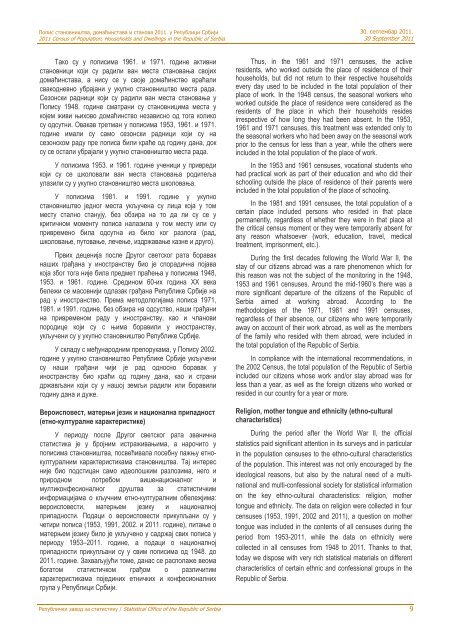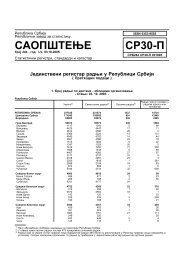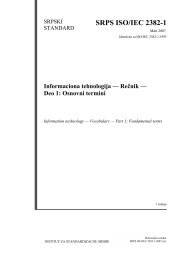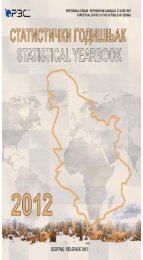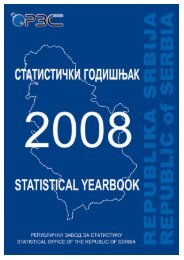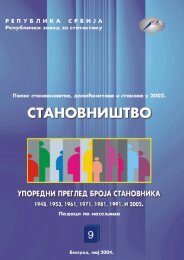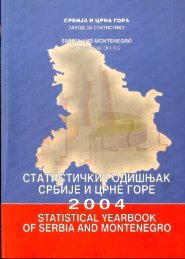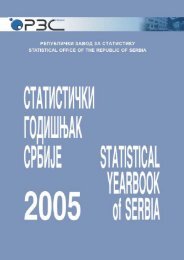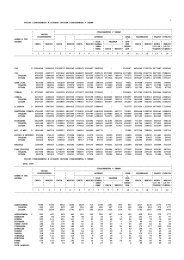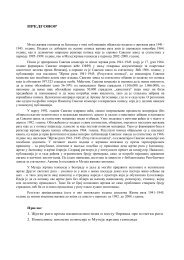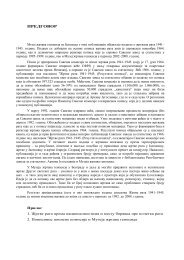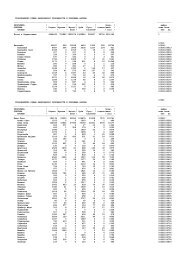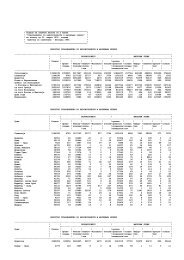Попис становништва, домаћинстава и станова 2011. у Републици Србији2011 Census of Population, Households <strong>and</strong> Dwellings in the Republic of Serbia30. септембар 2011.30 September 2011Тако су у пописима 1961. и 1971. године активнистановници који су радили ван места становања својихдомаћинстава, а нису се у своје домаћинство враћалисвакодневно убрајани у укупно становништво места рада.Сезонски радници који су радили ван места становања уПопису 1948. године сматрани су становницима места укојем живи њихово домаћинство не<strong>за</strong>висно од тога коликосу одсутни. Овакав третман у пописима 1953, 1961. и 1971.године имали су само сезонски радници који су насезонском раду пре пописа били краће од годину дана, доксу се остали убрајали у укупно становништво места рада.У пописима 1953. и 1961. године ученици у привредикоји су се школовали ван места становања родитељаулазили су у укупно становништво места школовања.У пописима 1981. и 1991. године у укупностановништво једног места укључена су лица која у томместу стално станују, без обзира на то да ли су се укритичном моменту пописа налазила у том месту или супривремено била одсутна из било ког разлога (рад,школовање, путовање, лечење, издржавање казне и друго).Првих деценија после Другог светског рата боравакнаших грађана у иностранству био је спорадична појавакоја због тога није била предмет праћења у пописима 1948,1953. и 1961. године. Средином 60-их година XX векабележи се масовнији одла<strong>за</strong>к грађана Републике Србије нарад у иностранство. Према методологијама пописа 1971,1981. и 1991. године, без обзира на одсуство, наши грађанина привременом раду у иностранству, као и члановипородице који су с њима боравили у иностранству,укључени су у укупно становништво Републике Србије.У складу с међународним препорукама, у Попису 2002.године у укупно становништво Републике Србије укљученису наши грађани чији је рад односно боравак уиностранству био краћи од годину дана, као и странидржављани који су у нашој земљи радили или боравилигодину дана и дуже.Вероисповест, матерњи језик и национална припадност(етно-културалне карактеристике)У периоду после Другог светског рата званичнастатистика је у бројним истраживањима, а нарочито упописима становништва, посвећивала посебну пажњу етнокултуралнимкарактеристикама становништва. Тај интересније био подстицан само идеолошким разлозима, него иприродном потребом вишенационалног имултиконфесионалног друштва <strong>за</strong> статистичкиминформацијама о кључним етно-културалним обележјима:вероисповести, матерњем језику и националнојприпадности. Подаци о вероисповести прикупљани су учетири пописа (1953, 1991, 2002. и 2011. године), питање оматерњем језику било је укључено у садржај свих пописа упериоду 1953–2011. године, а подаци о националнојприпадности прикупљани су у свим пописима од 1948. до2011. године. Захваљујући томе, данас се располаже веомабогатом статистичком грађом о различитимкарактеристикама појединих етничких и конфесионалнихгрупа у Републици Србији.Thus, in the 1961 <strong>and</strong> 1971 censuses, the activeresidents, who worked outside the place of residence of theirhouseholds, but did not return to their respective householdsevery day used to be included in the total population of theirplace of work. In the 1948 census, the seasonal workers whoworked outside the place of residence were considered as theresidents of the place in which their households residesirrespective of how long they had been absent. In the 1953,1961 <strong>and</strong> 1971 censuses, this treatment was extended only tothe seasonal workers who had been away on the seasonal workprior to the census for less than a year, while the others wereincluded in the total population of the place of work.In the 1953 <strong>and</strong> 1961 censuses, vocational students whohad practical work as part of their education <strong>and</strong> who did theirschooling outside the place of residence of their parents wereincluded in the total population of the place of schooling.In the 1981 <strong>and</strong> 1991 censuses, the total population of acertain place included persons who resided in that placepermanently, regardless of whether they were in that place atthe critical census moment or they were temporarily absent forany reason whatsoever (work, education, travel, medicaltreatment, imprisonment, etc.).During the first decades following the World War II, thestay of our citizens abroad was a rare phenomenon which forthis reason was not the subject of the monitoring in the 1948,1953 <strong>and</strong> 1961 censuses. Around the mid-1960’s there was amore significant departure of the citizens of the Republic ofSerbia aimed at working abroad. According to themethodologies of the 1971, 1981 <strong>and</strong> 1991 censuses,regardless of their absence, our citizens who were temporarilyaway on account of their work abroad, as well as the membersof the family who resided with them abroad, were included inthe total population of the Republic of Serbia.In compliance with the international recommendations, inthe 2002 Census, the total population of the Republic of Serbiaincluded our citizens whose work <strong>and</strong>/or stay abroad was forless than a year, as well as the foreign citizens who worked orresided in our country for a year or more.Religion, <strong>mother</strong> <strong>tongue</strong> <strong>and</strong> <strong>ethnicity</strong> (ethno-culturalcharacteristics)During the period after the World War II, the officialstatistics paid significant attention in its surveys <strong>and</strong> in particularin the population censuses to the ethno-cultural characteristicsof the population. This interest was not only encouraged by theideological reasons, but also by the natural need of a multinational<strong>and</strong> multi-confessional society for statistical informationon the key ethno-cultural characteristics: <strong>religion</strong>, <strong>mother</strong><strong>tongue</strong> <strong>and</strong> <strong>ethnicity</strong>. The data on <strong>religion</strong> were collected in fourcensuses (1953, 1991, 2002 <strong>and</strong> 2011), a question on <strong>mother</strong><strong>tongue</strong> was included in the contents of all censuses during theperiod from 1953-2011, while the data on <strong>ethnicity</strong> werecollected in all censuses from 1948 to 2011. Thanks to that,today we dispose with very rich statistical materials on differentcharacteristics of certain ethnic <strong>and</strong> confessional groups in theRepublic of Serbia.<strong>Републички</strong> <strong><strong>за</strong>вод</strong> <strong>за</strong> статистику / Statistical Office of the Republic of Serbia 9
30. септембар 2011.30 September 2011Попис становништва, домаћинстава и станова 2011. у Републици Србији2011 Census of Population, Households <strong>and</strong> Dwellings in the Republic of SerbiaНачин прикупљања података о етно-културалнимобележјима становништва у Попису 2011.Према међународним препорукама, питања о етнокултуралнимобележјима становништва не спадају у редтзв. основних обележја (core topics), па тако свака државасамостално одлучује да ли ће прикупљати ову врступодатака у попису. Уколико су питања о вероисповести,матерњем језику и националној припадности укључена усадржај основних пописних обра<strong>за</strong>ца, њихова формулацијатреба да буде што јаснија и прецизнија, а испитаник мораимати могућност да се потпуно самостално и слободноизјасни, као и право да се уопште не изјасни о овимпитањима.Питања о „етничким обележјима“ на обрасцу <strong>за</strong> лице(Пописница) формулисана су као питања отвореног типа, узправну поуку о томе да, према Уставу Републике Србије,грађани нису дужни да се изјасне о својој вероисповести(члан 43), односно о својој националној припадности (члан47).The method of collecting data on the ethno-culturalcharacteristics of the population in the 2011 CensusAccording to the international recommendations, thequestions on ethno-cultural characteristics of population do notbelong to the so-called core topics <strong>and</strong> therefore each countrydecides independently whether it wants to collect this type ofdata during a census. If the questions on <strong>religion</strong>, <strong>mother</strong><strong>tongue</strong> <strong>and</strong> <strong>ethnicity</strong> are included in the contents of the basiccensus forms, their formulation ought to be clear <strong>and</strong> precise,while the respondent must have a possibility to declare himselffully independently <strong>and</strong> freely, as well as the right not to makeany declaration at all as regards these questions.The questions regarding “ethnic characteristics” on theform for a person (Individual Form) are formulated as open-typequestions, with legal instructions saying that, pursuant to theConstitution of the Republic of Serbia, citizens are not underobligation to declare themselves in terms of their <strong>religion</strong> (article43) or their <strong>ethnicity</strong> (article 47).Приликом обуке непосредних учесника у теренскојреали<strong>за</strong>цији Пописа 2011. наглашено је да пописивачи несмеју да утичу, сугеришу или врше притисак на испитаникеприликом давања одговора на овај сет питања, тј. били судужни да упишу одговор тачно онако како се лице које дајеподатке изјасни. Пописивачима такође није билодозвољено да бришу или исправљају грешку начињенуприликом уписивања одговора у овом делу Пописнице, већсу у присуству испитаника морали да пониште обра<strong>за</strong>ц и дапопуне нови.За децу млађу од 15 година одговор о етнокултуралнимобележјима давао је родитељ, усвојитељ илистаратељ.Тиме су у Попису 2011. испуњени највишимеђународни стандарди по којима је сваком лицуобезбеђено право слободног изјашњавања о својојвероисповести, матерњем језику и националности.During the training of the direct participants in the fieldrealization of the 2011 Census, it was emphasized thatenumerators must not affect, suggest or pressure respondentswhen providing answers to this set of questions, i.e., that theywere under obligation to write down the answer exactly as theperson giving the data declared. The enumerators were also notallowed to delete or correct any errors made when writing downthe answers in this part of the census form, but rather they hadto annul the form <strong>and</strong> fill out a new one in the presence of therespondent.For children less than 15 years of age, the answer onethno-cultural characteristics were provided by the parent,adoptive parent or legal guardian.Thus, the 2011 Census met the highest internationalst<strong>and</strong>ards according to which each <strong>and</strong> every person wereprovided with the right to freely declare themselves on their<strong>religion</strong>, <strong>mother</strong> <strong>tongue</strong> <strong>and</strong> <strong>ethnicity</strong>.10<strong>Републички</strong> <strong><strong>за</strong>вод</strong> <strong>за</strong> статистику / Statistical Office of the Republic of Serbia
- Page 2 and 3: Република СрбијаРе
- Page 4 and 5: Попис становништва
- Page 6 and 7: Попис становништва
- Page 8 and 9: Попис становништва
- Page 12 and 13: Попис становништва
- Page 14 and 15: Попис становништва
- Page 16 and 17: Попис становништва
- Page 18 and 19: Попис становништва
- Page 20 and 21: Попис становништва
- Page 22 and 23: Попис становништва
- Page 24 and 25: Попис становништва
- Page 26 and 27: Попис становништва
- Page 28 and 29: Попис становништва
- Page 30 and 31: Попис становништва
- Page 32 and 33: Попис становништва
- Page 34 and 35: Попис становништва
- Page 36 and 37: Попис становништва
- Page 38 and 39: Попис становништва
- Page 40 and 41: Попис становништва
- Page 42 and 43: Попис становништва
- Page 44 and 45: Попис становништва
- Page 46 and 47: Попис становништва
- Page 48 and 49: Попис становништва
- Page 50 and 51: Попис становништва
- Page 52 and 53: Попис становништва
- Page 54 and 55: Попис становништва
- Page 56 and 57: Попис становништва
- Page 58 and 59: Попис становништва
- Page 60 and 61:
Попис становништва
- Page 62 and 63:
Попис становништва
- Page 64 and 65:
Попис становништва
- Page 66 and 67:
Попис становништва
- Page 68 and 69:
Попис становништва
- Page 70 and 71:
Попис становништва
- Page 72 and 73:
Попис становништва
- Page 74 and 75:
Попис становништва
- Page 76 and 77:
Попис становништва
- Page 78 and 79:
Попис становништва
- Page 80 and 81:
Попис становништва
- Page 82 and 83:
Попис становништва
- Page 84 and 85:
Попис становништва
- Page 86 and 87:
Попис становништва
- Page 88 and 89:
Попис становништва
- Page 90 and 91:
Попис становништва
- Page 92 and 93:
Попис становништва
- Page 94 and 95:
Попис становништва
- Page 96 and 97:
Попис становништва
- Page 98 and 99:
Попис становништва
- Page 100 and 101:
Попис становништва
- Page 102 and 103:
Попис становништва
- Page 104 and 105:
Попис становништва
- Page 106 and 107:
Попис становништва
- Page 108 and 109:
Попис становништва
- Page 110 and 111:
Попис становништва
- Page 112 and 113:
Попис становништва
- Page 114 and 115:
Попис становништва
- Page 116 and 117:
Попис становништва
- Page 118 and 119:
Попис становништва
- Page 120 and 121:
Попис становништва
- Page 122 and 123:
Попис становништва
- Page 124 and 125:
Попис становништва
- Page 126 and 127:
Попис становништва
- Page 128 and 129:
Попис становништва
- Page 130 and 131:
Попис становништва
- Page 132 and 133:
Попис становништва
- Page 134 and 135:
Попис становништва
- Page 136 and 137:
Попис становништва
- Page 138 and 139:
Попис становништва
- Page 140 and 141:
Попис становништва
- Page 142 and 143:
Попис становништва
- Page 144 and 145:
Попис становништва
- Page 146 and 147:
Попис становништва
- Page 148 and 149:
Попис становништва
- Page 150 and 151:
Попис становништва
- Page 152 and 153:
Попис становништва
- Page 154 and 155:
Попис становништва
- Page 156 and 157:
Попис становништва
- Page 158 and 159:
Попис становништва
- Page 160 and 161:
Попис становништва
- Page 162 and 163:
Попис становништва
- Page 164 and 165:
Попис становништва
- Page 166 and 167:
Попис становништва
- Page 168 and 169:
Попис становништва
- Page 170 and 171:
Попис становништва
- Page 172 and 173:
Попис становништва
- Page 174 and 175:
Попис становништва
- Page 176 and 177:
Попис становништва
- Page 178 and 179:
Попис становништва
- Page 180 and 181:
Попис становништва
- Page 182 and 183:
Попис становништва
- Page 184 and 185:
Попис становништва
- Page 186 and 187:
Попис становништва
- Page 188 and 189:
Попис становништва
- Page 190 and 191:
Попис становништва
- Page 192 and 193:
Попис становништва
- Page 194 and 195:
Попис становништва
- Page 196 and 197:
Попис становништва
- Page 198 and 199:
Попис становништва
- Page 200 and 201:
Попис становништва
- Page 202 and 203:
Попис становништва
- Page 204 and 205:
Попис становништва
- Page 206 and 207:
Попис становништва
- Page 208 and 209:
Попис становништва
- Page 210 and 211:
Попис становништва
- Page 212 and 213:
Попис становништва
- Page 214 and 215:
Попис становништва
- Page 216 and 217:
Попис становништва
- Page 218 and 219:
Попис становништва
- Page 220 and 221:
Попис становништва
- Page 222 and 223:
Попис становништва
- Page 224 and 225:
Попис становништва
- Page 226 and 227:
Попис становништва
- Page 228 and 229:
Попис становништва
- Page 230 and 231:
Попис становништва
- Page 232 and 233:
Попис становништва
- Page 234 and 235:
Попис становништва
- Page 236 and 237:
Попис становништва
- Page 238 and 239:
Попис становништва
- Page 240 and 241:
Попис становништва
- Page 242 and 243:
Попис становништва
- Page 244 and 245:
Попис становништва
- Page 246 and 247:
Попис становништва
- Page 248 and 249:
Попис становништва
- Page 250 and 251:
Попис становништва
- Page 252 and 253:
Попис становништва
- Page 254 and 255:
Попис становништва
- Page 256 and 257:
Попис становништва
- Page 258 and 259:
Попис становништва
- Page 260 and 261:
Попис становништва
- Page 262 and 263:
Попис становништва
- Page 264 and 265:
Попис становништва
- Page 266 and 267:
Попис становништва
- Page 268 and 269:
Попис становништва
- Page 270 and 271:
Попис становништва
- Page 272 and 273:
Попис становништва
- Page 274 and 275:
Попис становништва
- Page 276 and 277:
Попис становништва
- Page 278 and 279:
Попис становништва
- Page 280 and 281:
Попис становништва
- Page 282 and 283:
Попис становништва
- Page 284 and 285:
Попис становништва
- Page 286 and 287:
Подаци из овог обра
- Page 288 and 289:
27.ГДЕ ЛИЦЕ ПОХАЂА Ш
- Page 290 and 291:
Подаци из овог обра
- Page 292 and 293:
Сродство с лицем на
- Page 302:
ВЕРОИСПОВЕСТ, МАТЕ


